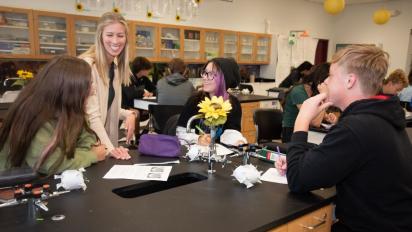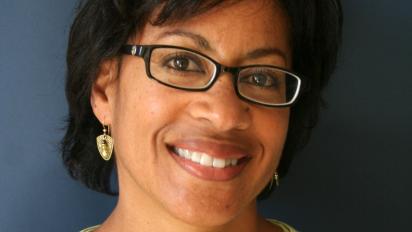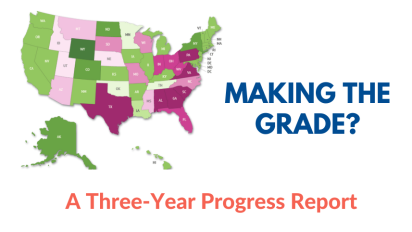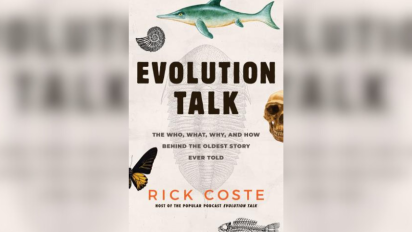"Making the Grade?": A Three-Year Progress Report

The headline of a recent story in The Nation declared, “Connecticut Will Require Public Schools to Teach Climate Change,” and asked, “Can More States Follow?” The story was of interest to NCSE not so much because of the topic — after Connecticut’s four-year struggle to enact a statutory requirement to teach climate change in accordance with the NGSS, it wasn’t news to us — as because of the invocation of “Making the Grade? How State Public School Science Standards Address Climate Change,” the 2020 report from the National Center for Science Education and the Texas Freedom Network Education Fund (TFNEF). As The Nation noted, the report gave “20 states a C+ or lower for how they addressed climate change in their science standards, with six — Alabama, Georgia, South Carolina, Pennsylvania, Texas, and Virginia — receiving an F.” Even after three years of sustained attention to the report, it was still gratifying to see that it was continuing to shape the discussion of climate change education.
Making "Making the Grade?"
When NCSE and TFNEF decided to assess state science education standards early in 2020, it was with a specific and limited purpose in mind: to educate Texas policymakers and stakeholders about the need to improve the treatment of climate change in Texas’s state science standards. The two organizations have a long history of working together to defend science education in the Lone Star State against ideological attack, both from the legislature and from the (elected) state board of education, so it was a natural fit. After designing a rubric, partly based on Edward W. Maibach’s celebrated octosyllabic summary of climate change — it’s real; it’s us; it’s bad; there’s hope — NCSE and TFNEF recruited three Ph.D. scientists with varying specialties to evaluate the standards: Sarah Myhre, a climate scientist specializing in paleoecology; Steve Rissing, a retired evolutionary biologist; and Casey Williams, an educational psychologist specializing in climate change education.
During the summer of 2020, the reviewers independently evaluated each of the 31 sets of state science standards then in use, including the Next Generation Science Standards, which are used in 20 states and the District of Columbia. They were asked to examine the middle school science standards and high school standards for biology, chemistry, physics, earth (or earth and space) sciences, and environmental sciences, since these are the standards for courses in which climate change is most likely to be discussed and which students are most likely to take. With respect to each of Maibach’s four points, they assessed how extensively and explicitly climate change was discussed, how coherently and clearly climate change was incorporated in the standards, and how well the standards prepared students for further study in higher education and for responsible participation in civic deliberation about climate change. Overall grades for the states were calculated on a curve from a weighted average of the reviewers’ ratings.
Media coverage in Texas and beyond
When the “Making the Grade?” report was released, it instantly received coverage in Texas, thanks to the fact that the state science standards received the grade of F, one of only six states to do so. There were stories in the Houston Chronicle and the Dallas Morning News, to say nothing of a commentary piece, “Texas shorting students in climate-crisis know-how,” by TFNEF’s Kathy Miller and NCSE’s Ann Reid in the Waco Tribune-Herald. Over the next few years, as Texas sporadically revised its state science standards, activists constantly brandished the ignominious grade in the service of arguing for improving the treatment of climate change. There were improvements, particularly in high school standards for Earth Systems Science and Environmental Sciences, although there were also missed opportunities for improvements, as when the state board of education insisted on language in the eighth-grade science standards that diluted the scientific accuracy of their treatment of climate change.
Outside Texas, there was immediately a modicum of national coverage, including a commentary by NCSE’s Ann Reid and TFNEF’s Val Benavidez in Bulletin of the Atomic Scientists, as well as reports in local media outlets across the country focusing on the grade received by their states, including Virginia, Arizona, and Indiana. As in Texas, there was evidence that “Making the Grade?” helped to bolster the efforts of those seeking improvements in the treatment of climate change in their state science standards. For example, the report appeared just in time to encourage improvements in Indiana’s standards, which received a D; the treatment of climate change in the new set of standards adopted in 2022 is similar to, but a bit more expansive than, that of the Next Generation Science Standards, which received the grade of B+ in “Making the Grade?” I made a point of congratulating the Hoosier State on its achievement in a commentary published in the Indianapolis Star.
The continuing relevance
As The Nation’s story illustrates, “Making the Grade?” continues to be relevant. In addition to the media attention already mentioned, the report has been discussed in articles in the Financial Times, the Washington Post, and The New York Times. More surprisingly, it’s been repeatedly cited in the scholarly and teaching literature, and not just by NCSE staff. (Lin Andrews and I contributed a discussion of the report to the April 2021 issue of In the Trenches, a publication of the National Association of Geoscience Teachers.). “Making the Grade?” has surfaced in venues ranging from the predictable, such as a 2021 article entitled “It’s About Time: Perceived Barriers to In-Service Teacher Climate Change Professional Development,” to the unpredictable, such as a 2022 article entitled “Essential Strategies for School Nurses to Move Upstream in Support of Healthy Students and a Healthy Planet” — although, come to think of it, school nurses certainly have a role to play in climate change education!
Reflecting on the enduring influence of the “Making the Grade?” report, it seems fair to conclude that NCSE was in a uniquely good position to help evaluate the treatment of climate change in state science standards. Thanks to our long-standing practice of cooperating and collaborating with local, state, and national organizations on matters of shared concern, it was easy for us to work together with TFNEF (which provided invaluable support to the project, including designing and maintaining the climategrades.org website), especially Dan Quinn there. Thanks to our network of concerned experts, it was easy for us to recruit Myhre, Rissing, and Williams as reviewers, for whose thoughtfulness we are indebted. Thanks to our dedicated, experienced, and enthusiastic staff, it was easy for us to design the study in such a way as to address the concerns of policymakers as well as to engage the interest of researchers. And all of this was made possible thanks to the support of people like you!
Selected Scholarly Citations of "Making the Grade?"
Ansari RA, Landin JM (2022). Coverage of climate change in introductory biology textbooks, 1970–2019.
PLoS ONE 7(12): e0278532.
Bist M, Mayberry L (2022). Multidisciplinary climate change education: determining effectiveness through comparative analysis.
Journal of Student Research 11(3).
Busch KC, Ayala Chávez R (2022). Adolescent framings of climate change, psychological distancing, and implications for climate change concern and behavior.
Climatic Change 171(21).
D’Apice HK, Bromley P. 2023. Climate change discourse in U.S. history textbooks from California and Texas. Environmental
Education Research DOI: 10.1080/ 13504622.2023.2206595.
Ennes M, Lawson DF, Stevenson KT, Peterson MN, Jones MG (2021). It’s about time: perceived barriers to in-service teacher climate change professional development.
Environmental Education Research 27(5):762–778.
Ferkany M (2023). Climate, science, and sustainability education. In Curren R, ed., Handbook of Philosophy of Education, pp. 353-364. New York: Routledge.
Kirkland L, Poppleton K (2021). Climate change education: a model of justice-oriented STEM education.
Connected Science Learning 3(1).
McGravey K, Hodgetts M (2023). Between neutrality and action: state speech and climate change.
Ethics, Policy & Environment 26(1):121–138.
Reiner KL, Haas-Howard C (2022). Essential strategies for school nurses to move upstream in support of healthy students and a healthy planet.
NASN School Nurse 37(4):217–222.
Sims RJ, Tallapragada M, Payton TG, Noon an K, Prosser KL, Childress MJ (2021). University experiences of marine science research and outreach beyond the classroom.
Integrative and Comparative Biology 61(3):1078–1088
Selected Press Coverage of "Making the Grade?"
Houston Chronicle
Education watchdogs give Texas an “F” for its climate change curriculum
The Dallas Morning News
Texas earns an ‘F’ in how it teaches students about climate change, groups say
Yale Climate Connections
Many states get poor grades on their climate education standards
UK National Association for Environmental Education
How well is climate change addressed in schools?
The Philadelphia Inquirer
Amid climate change crisis, Pa.'s science curriculum falls short
Financial Times
Schools face calls to boost environmental teaching
The New York Times
Many States Omit Climate Education. These Teachers Are Trying to Slip It In.
Washington Post
In one state, every class teaches climate change — even P.E.
E&E News
Texas officials target climate science in textbooks
The Nation
Connecticut Will Require Public Schools to Teach Climate Change. Can More States Follow?





